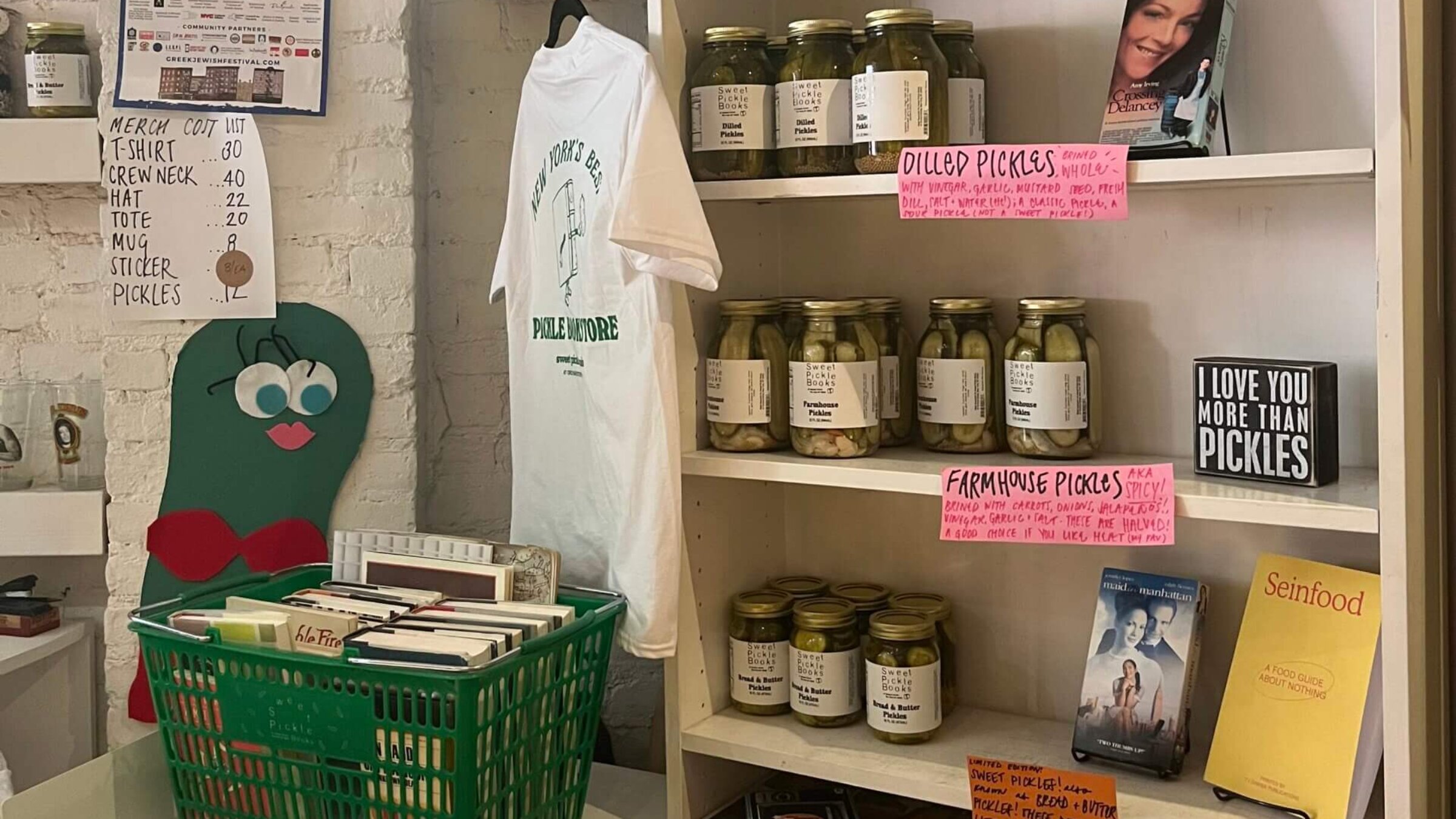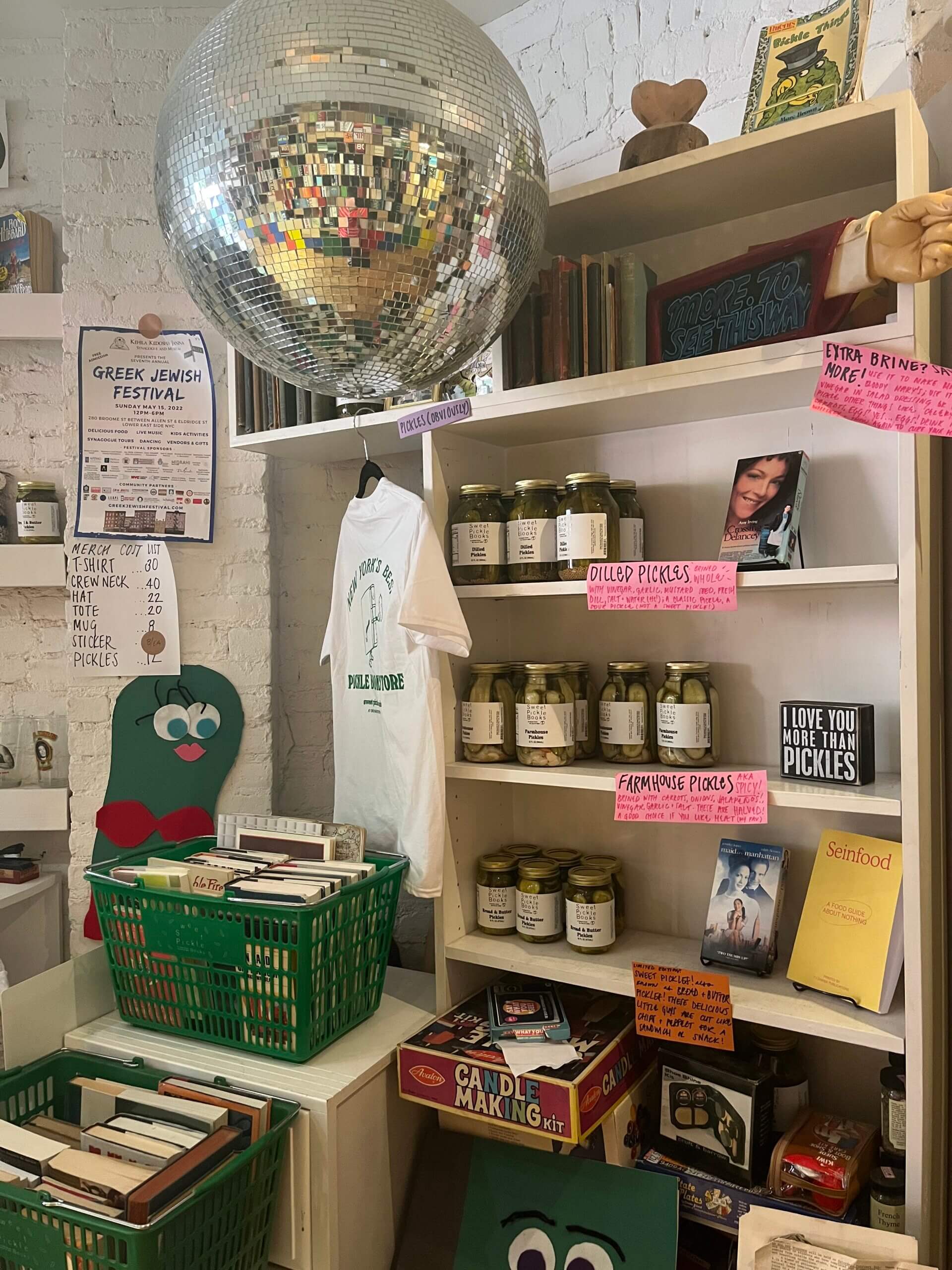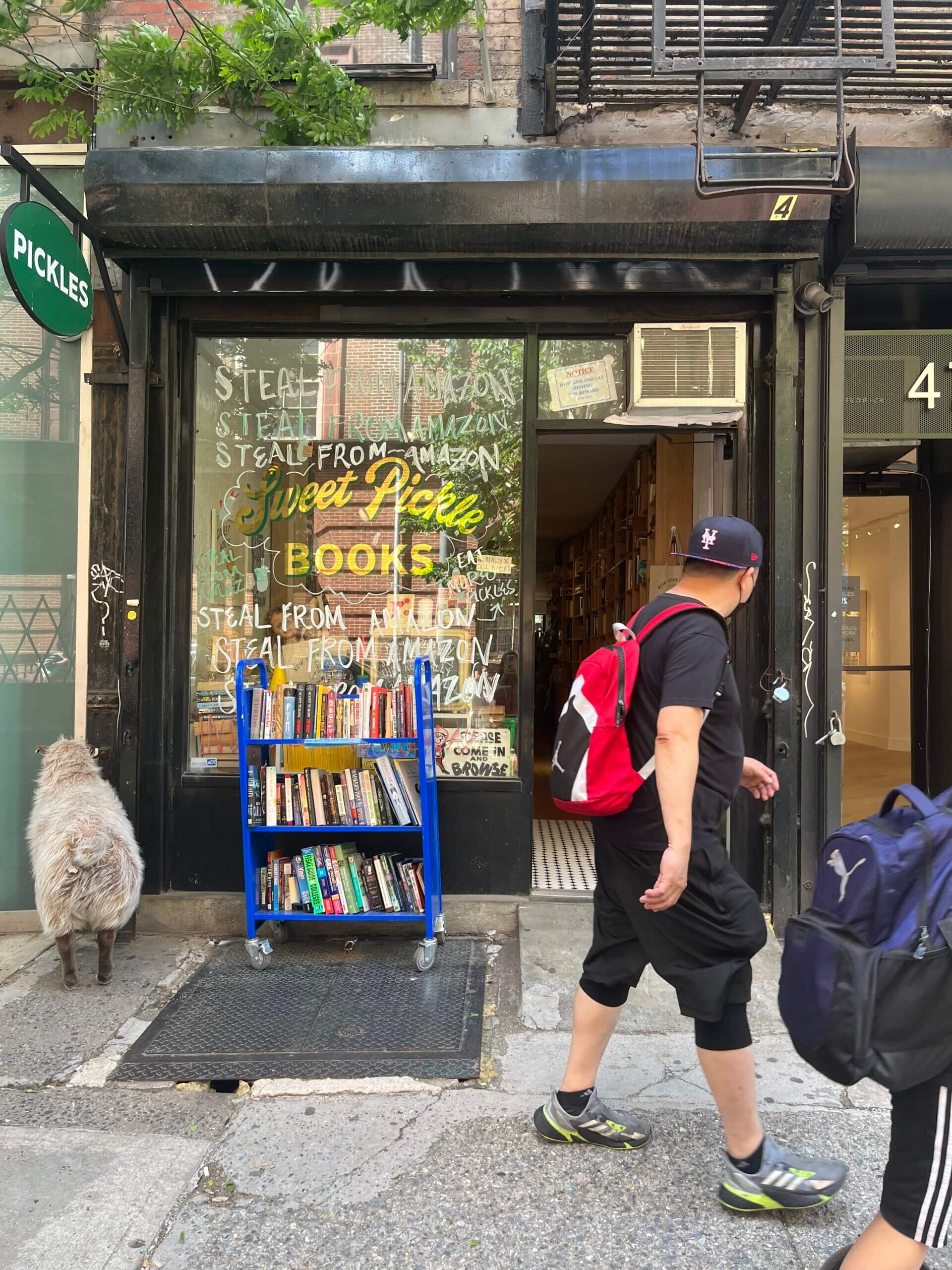At this Lower East Side bookstore, customers exchange tchotchkes for pickles
Bookshelves here hold not just pickles, but also Hanukkah candles, bat mitzvah photos and other tokens of Jewish culture.

Keying into nostalgia for the Lower East Side’s storied Jewish past is essential to making Altshuler’s business work. Photo by Lauren Hakimi/The Forward
It’s the kind of love story that could only ever happen in New York: A young bookstore employee, Isabelle, initially resists her grandmother’s efforts to set her up with Sam, a Lower East Side pickle vendor. But in the end, Isabelle gives in, and the two make out in Bubbe’s apartment.
That’s the plot of the much-loved 1988 film “Crossing Delancey.” And three decades after the movie’s release, one recently established institution is proving that literature and brine are still a winning combination on the Lower East Side.
As the owner of Sweet Pickle Books — a shop in Manhattan peddling used books and artisanal pickles — Leigh Altshuler is both Isabelle and Sam rolled into one. And her ability to key into nostalgia for the neighborhood’s storied Jewish past is essential to making her business work.
“It’s definitely an homage to the neighborhood and my ancestry,” said Altshuler, who grew up in Parkland, Florida, moved to the Lower East Side four years ago and opened Sweet Pickle in November 2020. The store is two blocks away from both the Tenement Museum and The Pickle Guys, a 10-minute walk to Katz’s Deli, a five-minute walk to the Eldridge Street synagogue and a five-minute walk to The Forward’s old office.
In other words: Jewish Lower East Side central.

“Crossing Delancey” is just one example of how the cultural and historical importance of the Lower East Side, where Jewish immigrants flocked during the late 19th and early 20th centuries, has been idealized for Jews nationwide. Altshuler’s store is a self-conscious participant in that tradition, wholeheartedly leaning into the neighborhood’s kitsch. And the connection between the store and film, which Altshuler watched with her mom while growing up, goes beyond attitude: Two customers have donated VHS tapes of the movie to her store, which are proudly on display alongside branded merchandise and copies of “Seinfood,” a photo album featuring the most iconic foods of “Seinfeld.”
That’s just the start of the Jewish whimsy on display. Hanukkah candles add flair to bookshelves, and a pink handwritten sign explains that “we understand Timothée Chalamet is hot.” Photos from Altshuler’s bat mitzvah grace the walls, and during a recent visit, a playlist of live performances by Amy Winehouse — herself a proud cultural Jew — played in the background.
But perhaps the store’s most stylish feature is the huge slogan on its facade, repeated six times for emphasis, imploring passersby to “STEAL FROM AMAZON.” This is exactly the kind of energy that suits the modern-day Lower East Side, which, despite becoming trendy and expensive, has held on to some grit — and a serious dose of neighborly spirit.
“Without the neighborhood, the store wouldn’t be able to exist the same way,” Altshuler said. The area lacks chain stores, she explained, partly because its residents like supporting local businesses.
“It’s one of the only neighborhoods where you can walk around and actually know the name of the person who runs the coffee shop, or the bookstore, or the laundromat, or the restaurant, or whatever,” she said.
The fact that so many of Altshuler’s customers come back and donate books and other trinkets is a testament to that sense of community.
“Stuff usually just finds its way in here,” Altshuler said. “Sometimes people come in and they donate books and they’ll be like, ‘Can I donate this weird menorah?’ I’ll be like, ‘Sure.’”
In exchange for their knickknacks, donors each get a 32-ounce jar of pickles, which would otherwise set them back $12.
Sometimes, Altshuler finds photographs, letters or receipts in books people have donated. She often tapes those photographs to the wall with a note asking, “Is this you/your family/your friend?”

“Someone actually recognized somebody,” Altshuler said. “She checked out and she came running back. ‘How do you know that family?’ I’m like, ‘I don’t.’ She’s like, ‘I know them. I used to babysit them 25 years ago. This kid is 30. He lives in Beijing.’”
Altshuler got in touch with the boy in the photo, and now that he’s back in the U.S, she’s waiting for him to come pick up the picture.
But while the store has become a community staple, it has fans from outside the neighborhood. Queens resident Theresa Stanley, who says she’s been to the store about five times, hasn’t yet donated anything particularly weird — just some books. “I didn’t really need money for them, so pickles sounded good,” she said.
Recently, as the store has gotten more popular, Altshuler has fielded orders from around the world, including London and Italy. The traction might come from the media coverage the store has gotten, its impressive Instagram presence or simply word-of-mouth.
Once a one-woman show, Altshuler has now hired two employees. “People will send me texts of people they see wearing the tote out in Central Park or on the subway. So things like that have changed. It’s no longer just me in here.”















